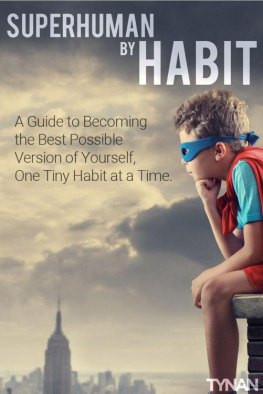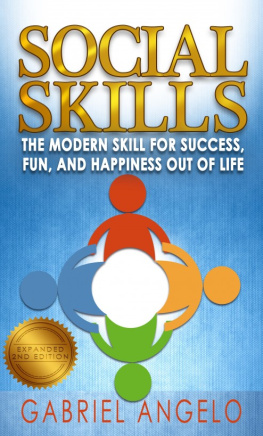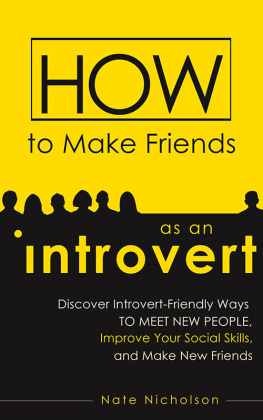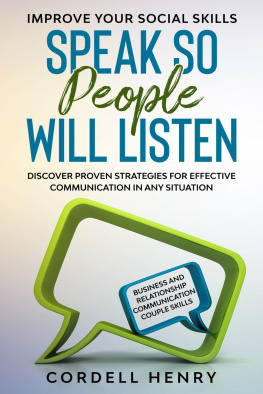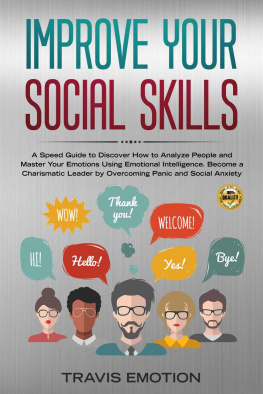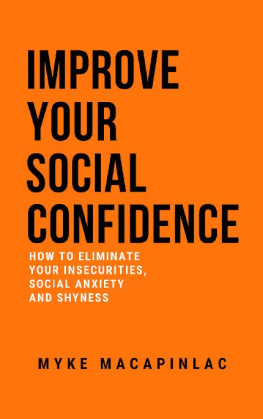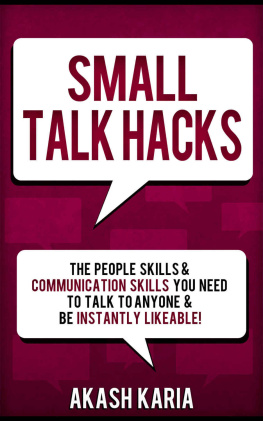Dedicated to my friends, of course.
Introduction
Few would argue against the idea that the group of people you surround yourself with will dictate the course of your life more than any other factor. This is true not just for extroverts, but for introverts as well. Regardless of the amount of time we choose to share with others, that connection has an outsized impact on our lives.
Think back to your most positive memories. How many didn't involve other people? Few or none, most likely. How about the periods of your life where you grew the most as a person? Weren't friends or mentors guiding or supporting you? Even the hardest times in your life were most likely made better because of others.
This book is based on a simple principle, that the people and friendships in our lives are important. They're important enough to think about social skills consciously, and to put effort into improving them. They're important enough to justify doing hard work to make ourselves better friends and family members.
The people you interact with could be slotted into three categories. There are acquaintances, friends, and members of your close friend group. Each of these categories requires you to share a different part of yourself, and brings a critical benefit into your life.
Through reading this book, you should be able to make strangers into acquaintances that like you. You'll learn the art of conversation and how to share the best parts of you in an honest and authentic way. You'll learn how to make new friends, and how to be the kind of friend that people want to have. And, last, you'll learn how to build a group of friends with whom you'll share support, quality time, and love.
If you don't understand why you don't have more friends, or if the process of making them frustrates you, you'll be able to start from scratch and build a completely new social life. If you have good social skills but find certain social situations puzzling, this book should eliminate that confusion. And even if you have great friends and have no problems making new ones, I hope that you'll learn a few things to make those relationships even better. Some friendships you'll have for life, so even a small improvement can be important.
Few people excel at any skill without thoughtful consideration and practice, and social skills are no exception. I went from being an introvert who was too shy to interact with friends-of-friends, to someone with amazing friends all over the world, and a core group of close friends with whom I share much of my life. By understanding the skills and principles that underpin social interaction, whether with strangers or best friends, you can break out of any mold you may find yourself in, and build superhuman social skills.
Social Skills are Skills
If you were bad at, say, badminton, you'd probably do something about it. You wouldn't feel bad about yourself, but you'd take steps to improve. Maybe you'd read books, watch some videos, ask friends for help, or take lessons. No matter which path you took, you'd practice. You would analyze your progress and the results of your practice, and you'd make course corrections.
When you finally got good at badminton, you might share the story of how you improved, and would expect that people would generally look favorably on your course of actions. You identified an area of your life that needed improvement, you came up with steps to turn it into a strength, you executed on that plan, and you succeeded.
Although we use the phrase social skill, we treat social skills more like a mystic inborn force than an actual practicable skill. We act as if social skills are genetically predetermined, like hair color or eye color. If we have poor social skills, or inconsistent social skills, we generally accept that that's our lot in life.
Maybe this comes from the idea that learning badminton isn't changing oneself, but learning social skills is. The way we interact with others is so core to our experience in life that we equate it to who we are. And there's some truth to that, too. How we portray ourselves to others will define their experience of who we are. The same person is considered a jerk and a saint to two different people, not because he actually is either of those things, but because of how he treats them.
Generally speaking, change is scary, especially for friends of the person who is changing. Insecurities surface, as do questions of motives. Why is he trying to become someone he's not? Why can't he just be himself?
But what is self-improvement if it's not actually transforming us into better versions of ourselves? We keep the good things about ourselves, maybe even make them better, but we also attack our weaknesses and reduce or eliminate them. We all have deficiencies and can be better.
It's about time social skills were treated like skills, and any stigma associated with improving them was left behind. We should encourage people who take the brave step of admitting that something so core to their being needs improvement, even when that person is ourself. Yes, we'll become different people, but we were going to do that anyway. We change all the time, usually in imperceptible increments, so why not guide that change?
A Word on Manipulation
I gave a speech at a university once, followed by a Q&A. The questions from the students were sharp, leading to interesting discussion. Near the end a professor asked, in a rather accusatory way, if practicing social skills wasn't just manipulating and lying to people.
Many people think that consciously improving one's social skills is manipulative, deceptive, or disingenuous. If you're anything like that professor, it's unlikely anything I can say will change your mind. This reaction, as best I can tell, is borne from insecurity that can't be erased through a few paragraphs of explanation.
I see learning social skills as the exact opposite. To me, it's the practice of becoming the very best person you can be, maximizing what you have to offer others. It's about communicating who you are as clearly as possible, and removing barriers preventing you from understanding others with that same clarity. It's about really understanding what others are looking for in a conversation or in a friend, and working to give them that very thing, if you are so capable. We do things all the time with the intention of eliciting a result from someone else. That alone is not manipulation. I might tell a joke to make a friend laugh. Technically I have taken an action to precipitate a reaction from him, but few would call that manipulative.
Manipulation has a connotation of ulterior motives. It implies that we can get someone to do something against their will or better interests by cajoling them or presenting a false impression of ourselves.
That's not at all the goal of building social skills. The goal is to understand better what other people really want, to identify where that intersects with what you want, and to have the social tools required to get both people what they're hoping for. It's also about understanding where there isn't an intersection, and moving on.
The tools we use to do this are self-awareness, situational awareness, good communication skills, and an understanding of humor, empathy, and social dynamics. Some will dismiss this practice as manipulation, but I think that's a pretty big stretch.
Maybe the litmus test most easily comprehended on an emotional level is this: if a stranger worked hard to be a better conversationalist, would you hold it against him when you had a great conversation with him? If you found out that one of your best friends worked hard to be the best friend they could be, would you be offended, or would you be flattered?
In this book, I will be unabashedly analytical, examining and quantifying aspects of social skills that are usually not spoken about. We'll talk about power dynamics, our value as friends, opportunity cost, and efficient use of time. Whether or not we acknowledge these, and other, factors, they underpin our social interactions and play an enormous role in the quality of relationships in our lives. Some find these topics unpalatable, or even offensive, but it's hard to make a better sausage if you don't take a look at what's going inside the factory.
Next page

